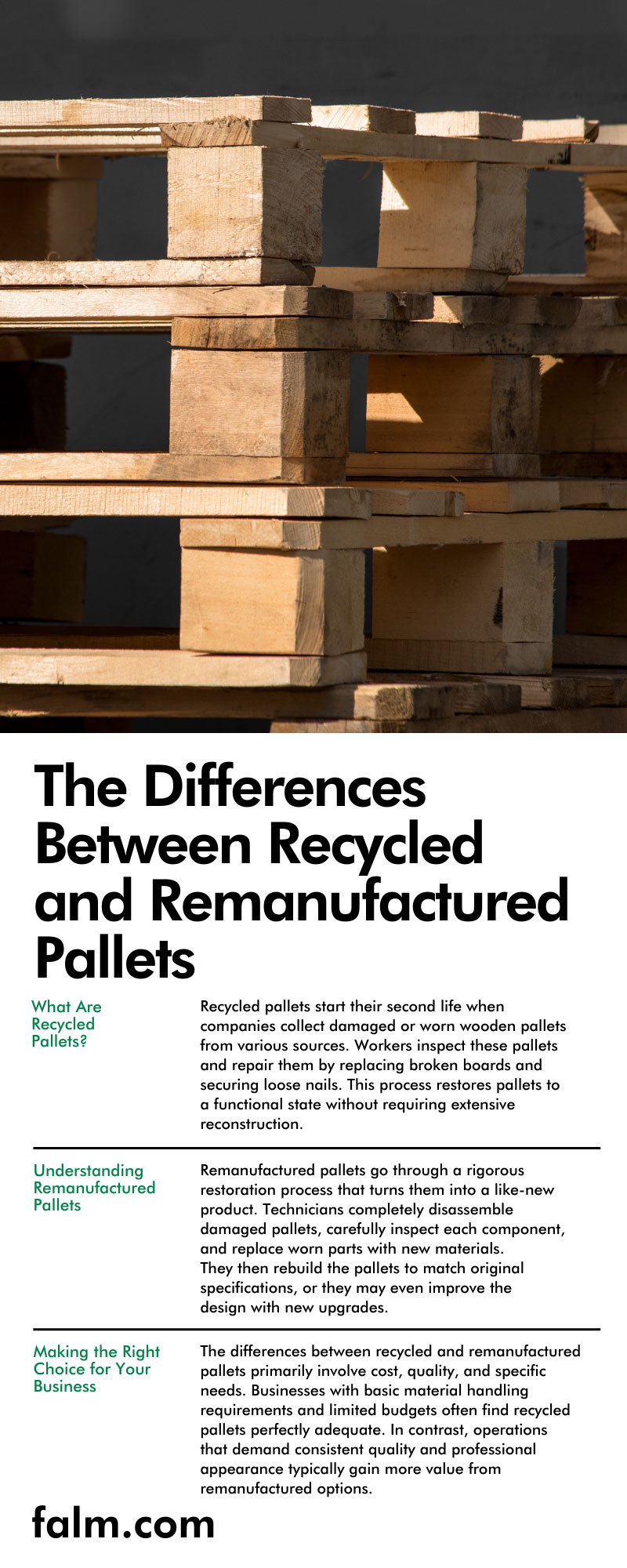Businesses across various industries rely on pallets to move products efficiently, yet many don’t realize they can choose sustainable alternatives to buying new wooden platforms. Two leading eco-friendly options include recycled pallets and remanufactured pallets. Understanding which option works best for your business can save money and reduce your environmental impact.
As you learn about the differences between recycled and remanufactured pallets, you will start to see distinct advantages depending on your specific shipping needs, budget constraints, and quality requirements. Our guide breaks down everything you need to know about these sustainable pallet options, helping you make informed decisions for your business.
What Are Recycled Pallets?
Recycled pallets start their second life when companies collect damaged or worn wooden pallets from various sources. Workers inspect these pallets and repair them by replacing broken boards and securing loose nails. This process restores pallets to a functional state without requiring extensive reconstruction.
Most recycled pallets show clear signs of prior use, such as stains, scratches, or minor warping. Companies often find used pallets for sale through local suppliers who collect and refurbish these materials. Recycling pallets typically gets them back in use faster and also uses fewer resources.
Understanding Remanufactured Pallets
Remanufactured pallets go through a rigorous restoration process that turns them into a like-new product. Technicians completely disassemble damaged pallets, carefully inspect each component, and replace worn parts with new materials. They then rebuild the pallets to match original specifications, or they may even improve the design with new upgrades.
This detailed work produces pallets that look and perform nearly identical to new ones. Re-Man pallets often include quality guarantees and meet strict industry standards. Businesses searching for used pallets for sale—that offer maximum durability and reliability—often choose remanufactured options, even with higher upfront costs.
Quality Standards and Durability
Recycled pallets perform well for many uses, but can vary in how durable they are from one unit to the next. Some recycled pallets endure multiple shipping cycles without issues, while others need a replacement sooner than expected. Inspecting them closely can reveal weak points, but determining their exact lifespan is still difficult.
Remanufactured pallets, however, deliver more consistent performance because technicians replace all worn parts during the rebuilding process. These pallets typically last longer than recycled ones and handle heavier loads more effectively. Quality control processes check that each Re-Man pallet meets specific strength and size standards.
Cost Considerations and Budget Impact
Recycled pallets are a budget-friendly and sustainable option, typically costing significantly less than remanufactured alternatives. This lower cost makes recycled pallets a practical choice for businesses with tight budgets or for uses where appearance is less important. However, businesses should factor in how often they require replacements to meet long-term budget calculations.
Reman pallets, while costing more upfront, often deliver better long-term value because they last longer and need fewer replacements. Companies that ship high-value products or require a consistent pallet appearance often view the higher cost as worthwhile. Used pallets for sale—that are remanufactured instead of recycled—generally cost more initially but provide reliable performance and lower overall ownership costs.
Environmental Benefits and Sustainability
Recycled pallets keep thousands of wooden platforms out of landfills each year and reduce the need for new lumber. The recycling process uses very little energy and generates minimal waste, making it an environmentally friendly option.
Remanufactured pallets achieve even greater environmental benefits by extending how long pallets remain in use compared to basic recycling. The remanufacturing process creates pallets that perform like new while reusing existing materials as the base. Both types of pallets support circular economy principles by keeping materials in active use and reducing waste.
Applications and Industry Uses
Recycled pallets work well for internal warehouse tasks, short-distance shipping, and uses where appearance is not a priority. Many businesses rely on recycled pallets to store raw materials, organize inventory, or ship non-critical products. Industries such as agriculture, construction, and manufacturing depend on recycled pallets for affordable material handling.
Remanufactured pallets are better for tasks that require consistent quality, such as retail distribution, food service, and pharmaceutical shipping. Companies exporting goods internationally often choose remanufactured pallets to meet strict quality standards. Customer-facing operations also benefit from the polished and professional look of reman pallets.
Inspection and Selection Criteria
Choosing recycled pallets requires inspecting their structural condition, including checking for cracked boards, loose nails, and excessive wear. Buyers should examine load-bearing components closely and reject pallets with significant damage. A second aspect to consider is that the sizing stays consistent with your racking systems or shipping containers.
Some feel selecting remanufactured pallets is simpler due to the quality control required in the production process. Buyers can trust supplier guarantees and industry certifications when evaluating remanufactured options. Standard dimensions and performance specifications make the selection process more straightforward than with recycled pallets.
Supply Chain and Availability
The supply of recycled pallets often depends on local business activity and seasonal trends. Peak shipping seasons create more damaged pallets for recycling, while slower periods may create supply shortages. Regional suppliers usually stock common sizes, but custom dimensions may require additional lead time.
Reman pallets involve more planning and processing, resulting in a steadier but sometimes longer delivery timeline. As with recycled pallets, suppliers often keep popular sizes in stock while producing custom orders as businesses order them. Businesses planning large purchases should work closely with suppliers for timely deliveries.
Making the Right Choice for Your Business
The differences between recycled and remanufactured pallets primarily involve cost, quality, and specific needs. Businesses with basic material handling requirements and limited budgets often find recycled pallets perfectly adequate. In contrast, operations that demand consistent quality and professional appearance typically gain more value from remanufactured options.
There is no one-size-fits-all approach. Your best bet is to work with a trusted supplier and hybrid your plan so that you use both recycled and Re-Man pallets. When you determine how many pallets you need, just factor in the initial purchase price, replacement frequency, damage rates, and the outward appearance of your brand.
Creating Value From Sustainable Pallet Choices
Smart businesses evaluate their entire pallet strategy rather than making decisions in isolation, and partner with experienced suppliers who understand their specific needs. Reliable suppliers can help you determine the best choice for each application and provide ongoing support to maximize value from your pallet investment.
When you are ready to explore sustainable pallet solutions for your business, reach out to First Alliance Logistics Management. They offer expert guidance on selecting the right recycled or remanufactured pallets for your business needs.


